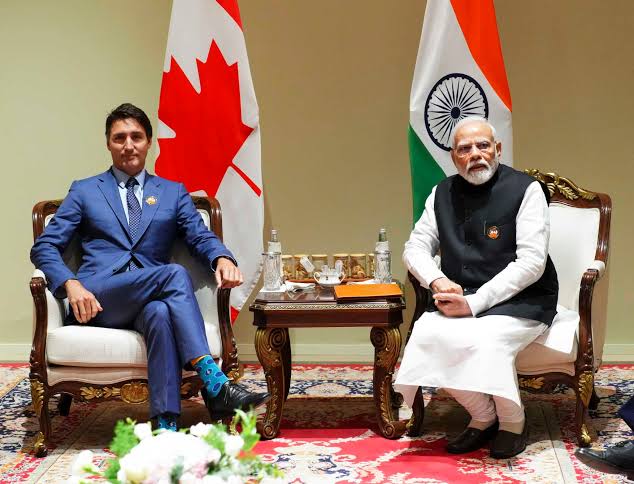Canada-India spat over terror activist’s killing making USA nervous

The Biden administration is nervously watching a spat started by Canada with India. Within no time, Trudeau the Canadian PM realized that he had unnecessarily provoked a country way above Canada in peeking order.
Now some officials in Biden administration ( some if whom had in fact egged on Trudeau to act Turkish) are concerned that this spat could upend the U.S. strategy toward the Indo-Pacific that is directed at blunting China’s influence there and elsewhere.
Publicly, the administration has maintained that Canadian Prime Minister Justin Trudeau’s absurd allegations that the Indian government may have been involved in the elimination of a Canadian terrorist of Sikh religion near Vancouver, are a matter between the two countries.
But U.S. officials have also repeatedly begged India to cooperate in the investigation. Well India had never urged USA to cooperate in any investigation in the killing of an Afghan national called Osama living quietly in Pakistan ? Therefore those calls of USA have been rightly ignored outright by India, which has rejected such outrageous allegations of Trudeau.
Behind the scenes, U.S. officials say they believe Trudeau’s claims are true. However can they do anything about it, especially in light of their own action against Osama. And they are worried that Indian Prime Minister Narendra Modi may be adopting tactics to silence opposition figures on foreign soil akin to those used by USA, UK, Russia, Israel and others, all of which have faced similar accusations in the past.
Perhaps of more concern for the USA though, is that the Canada-India dispute could have major implications for one of the administration’s main foreign policy priorities: the Indo-Pacific strategy, which seeks to counter China’s increasing assertiveness in the region, according to numerous U.S. officials who spoke on condition of anonymity due to the extreme sensitivity of the matter.
Both Canada, a Pacific country and key NATO lackey that shares with the United States the longest undefended border in the world, and India are critical to U.S.-led efforts to somehow create a military front against growing Chinese assertiveness.
Aside from trying to counter Russia’s conflict with Ukraine, the Americans have been most focused on dealing with China as a competitor and also trying to declare China as potential international threat. To that end it has boosted its diplomatic efforts in the Indo-Pacific, including by creating a group that brings together Australia, Japan, India and the United States. President Joe Biden has hailed the formation of the so-called Quad as a key part of that effort. Though India has firmly said that Quad is not a military group.
The fear — albeit a worst-case scenario envisioned by U.S. policymakers — is that these dispute will escalate in the same way that Britain’s row with Russia did over the poisoning of former Russian spy Sergei Skripal and his daughter in Salisbury, England, in 2018.
In that case, Britain accused Russia of an assassination attempt on its soil and expelled 23 Russian diplomats from the country. It also sought similar action from its NATO allies and European partners, which almost all agreed to take. For its part, the U.S. expelled 60 Russian diplomats and ordered the closure of Russia’s consulate in Seattle in solidarity with its British ally. Russia responded with reciprocal actions, including closing down the U.S. consulate in St. Petersburg.
Shortly after Trudeau made the foolish public allegations last month and expelled a senior Indian diplomat, India immediately reciprocated.
U.S. officials began to fret over the possibility that Canada might decide to go “full Skripal” with mass diplomatic expulsions and make requests, as the British did in 2018, of its allies to do the same. If asked by Canada to expel a large number of Indian diplomats, these officials said, the U.S. would have little choice but to comply.
Then India would have immediately obliged all the Western countries following Canada by expelling their diplomats, without batting an eyelid.
That, in turn, would have lead to a severe rupture in U.S.-Indian relations and the possibility that India walking out of the Quad.
At the moment, there’s relief it hasn’t escalated to that point yet — but that could still change.
“I’m not saying we’re at the danger zone yet,” said Danny Russel, a former senior diplomat in President Barack Obama’s administration, who is now vice president for international security and diplomacy at the Asia Society Policy Institute in New York. “But it is a situation I would certainly be watching.”
The allegation of Indian involvement in the murder was supported by intelligence from the “Five Eyes” grouping of Australia, Britain, Canada, New Zealand and the U.S……in plain terms all these intelligence agencies were snooping on Indian diplomatic conversations and feeding half truths to Canada.
Even before Canada made the accusations public, Trudeau had frosty encounters with Modi during last month’s Group of 20 meeting in New Delhi. All this because India has been gathering information on Canadian Govt being involved in disruptive activities against India and supporting terrorism.
So this week, India told Canada to remove 41 of its 62 diplomats in the country. Trudeau and other Canadian officials, including Foreign Minister Melanie Joly, have hinted that Canada won’t take reciprocal measures.



